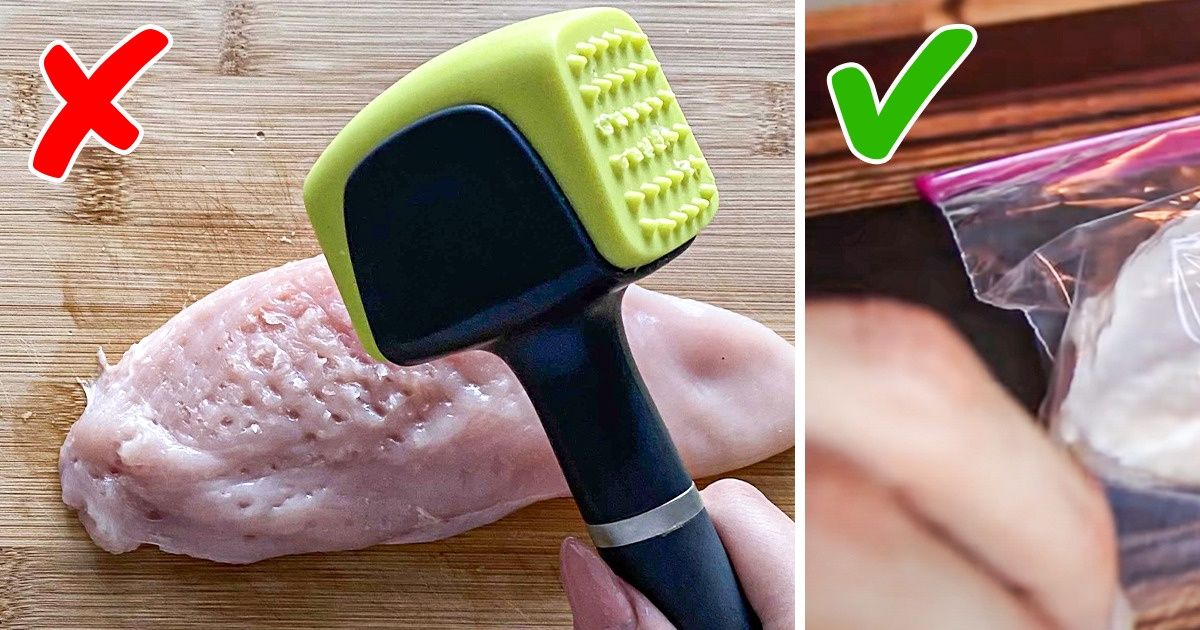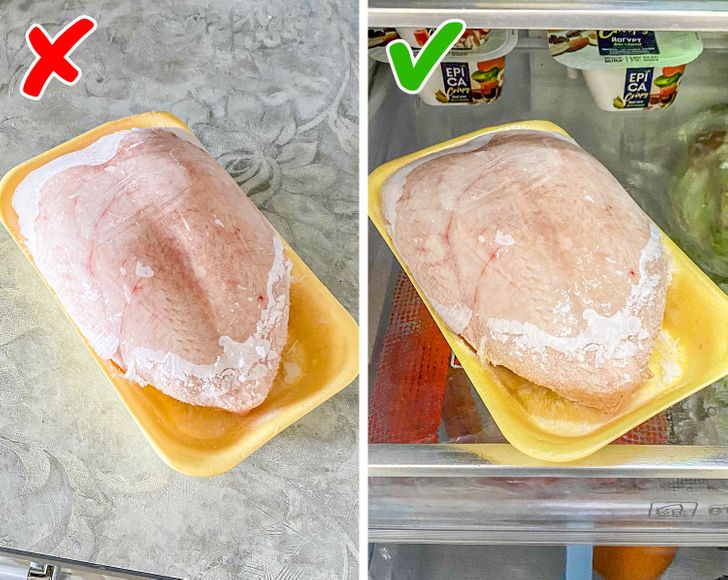I Refused to Be Treated Like a Maid in My Own Home—So I Changed the Rules


Oftentimes, we unconsciously adopt methods of how to do things from our relatives and other people around us, subconsciously implementing them into our routine for years. At the same time, we assume that since these methods have been used for a long time, they must be effective and solely true. However, in fact, the noble age of certain traditions, like those in the culinary arts, for example, doesn’t always mean we should follow them.
We at Bright Side studied the most widespread cooking habits and, much to our surprise, found out that many of them should have been ditched a long time ago. As it turns out, if we do things differently, food will be tastier and more useful, and we’ll have way fewer hassles while cooking.

In order to defrost meat faster, we tend to leave it on the countertop at room temperature. However, this isn’t the best option. The reproduction of bacteria accelerates in such conditions, and it is very easy to miss the moment when the meat actually starts to go bad because it won’t be noticeable on the outside.
It’s much safer to defrost meat products in the fridge, experts believe. It can take a bit more time but the meat will be fresh and cooled down. Another faster and less time-consuming option is defrosting in cold water. For this, you need to place the meat in an airtight package and put it into a container with water. Make sure to change the water in the container every half hour.
Everyone knows that vegetables should be washed before they’re cooked. But simply keeping them under a stream of water, sluggishly stirring them in a colander is not enough. Perhaps that helps remove visible dirt, but things like pesticides, microbes, and ingrained dirt won’t be washed off.
The main thing to remember when washing veggies and fruits is the mechanical action, researchers say — it’s necessary to rub the food under the water with your hands. Another piece of advice from experts is to soak vegetables and fruits in water with the addition of soda.
Dried fruits can be eaten without soaking them. But if you plan on adding them to a salad or a baked good, it’s necessary to steep them in boiling water for 10-15 minutes.
This step will make them softer, and the taste will become more vivid. What’s more, steeping is extremely important when it comes to baking because dried fruits can absorb moisture, thus breaking the recipe balance, leaving you with an unexpected result.
For some reason, it’s believed that the longer meat gets marinated, the tastier and juicier it will become. In fact, keeping the meat in the marinade for too long makes it rubber-like, not tender.
It’s the acid, which is added to the marinate in the form of vinegar or lemon, that’s to blame. In order for the meat of any kind to acquire a piquant taste without collapsing its texture, it’s enough to marinate it for literally 20 minutes.
Garlic fries very fast — perhaps you’ve already noticed this. The simultaneous addition of garlic and onion to the pan poses a problem since within the same time garlic manages to almost burn, the onion becomes just barely golden.
To make the frying process of onions and garlic more uniform, you need to chop the garlic into large pieces. Or, if the recipe asks for grated or finely chopped garlic, keep in mind that it will fry within 10 seconds. This means that it’s better to first prepare other ingredients, then add them to the garlic immediately. You can also chop and add garlic as the last ingredient.
Oftentimes, we use approximately the same approach when it comes to preparing dough for different types of baked goods. But things that are good for one dish can be bad for another. Long mixing and kneading of the dough makes it denser and more elastic due to the active release of gluten.
This option is perfect for cooking pizza, but it’s not that good for cooking pies. That’s because the dough in pies, as a rule, should be puffy, tender, and crumbly rather than tight and compact. That’s why we should keep this method in mind to get tastier baked goods.
To ensure that a steak becomes crispy when frying it, don’t throw it into the pan immediately after adding spices. The salted meat gives off a large amount of moisture, which, in the end, can prevent it from roasting and will make it boiled. Or you’ll have to keep meat pieces on the fire longer, which will lead to dryness.
In order to prevent that from happening, let the meat sit with spices on it for 15 minutes, periodically blotting out any released moisture with a paper towel.
To make potatoes boil more evenly and fast, it’s worth covering the pot with a lid, as this will accumulate and retain heat more efficiently. However, there is a common misconception that says this can cause the potatoes to fall apart.
In fact, this dreaded effect isn’t actually due to the lid, but rather, to putting the potatoes in boiling water. It makes the outer part of the potatoes boil faster and, of course, they start falling apart by the time the insides reach the necessary degree of readiness.
It’s quite easy to dry out poultry, especially partially. For example, the thin rim of brisket will definitely cook faster than the thicker rim. To let the meat fry evenly, it’s enough to pound it and make it flat. But there are some nuances to keep in mind.
Don’t pound a piece of meat without placing it into a plastic bag or at least covering it with a food film. If you don’t, small particles that are invisible to the eye can scatter over the countertop, spreading bacteria. Also, by not covering the meat, we risk killing the fibers, making the cut less tender, more crumbly, and even more prone to overdrying.
What other culinary mistakes that continue to get passed down from generation to generation can you add to this list?











